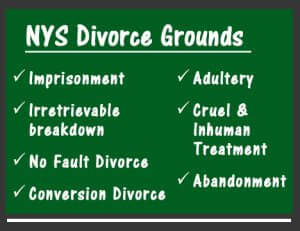Understanding the Grounds for Divorce in the State of New York
 Having tried to work out your relationship with your spouse and considered the pros and cons of divorce and legal separation, you have decided to seek the services of a Long Island divorce attorney in ending your relationship. You haven’t come to this decision lightly, but you know it is the best thing for you, your spouse and your children (if any) and you’ll all be happier and lead better lives apart than together.
Having tried to work out your relationship with your spouse and considered the pros and cons of divorce and legal separation, you have decided to seek the services of a Long Island divorce attorney in ending your relationship. You haven’t come to this decision lightly, but you know it is the best thing for you, your spouse and your children (if any) and you’ll all be happier and lead better lives apart than together.
If you have not yet been to see a divorce attorney, you may be wondering if there are any limitations on an action for divorce. When reviewing the specific circumstances of your relationship, you may wonder what will be important to your court case and what will be immaterial. Fortunately for you and the thousands of Long Island couples who get divorced each year, New York State permits couples to get divorced for seven (7) different, all unique, reasons. What this means for you is that the grounds that were appropriate for your friend or cousin may not be appropriate for you and your relationship. Accordingly, you will find a basis for divorce that fits your personal situation below.
Cruel & Inhuman Treatment
According to Long Island Divorce Attorney Robert E. Hornberger, Esq. in New York couples may get divorced if one spouse has subjected the other to cruel and inhuman treatment. These grounds include physical, emotional, or verbal abuse that endangers the other’s physical or mental well-being. If you feel you are in an abusive relationship and wish to file a complaint in a divorce action you MUST be aware of the five (5) year statute of limitations which applies in this instance. This is simpler than it sounds, as all this statute of limitations means is that the cause of action, in this case the abusive behavior, must have occurred within the last five (5) years for the case to be actionable. If it has been five (5) years and one (1) day since your spouse hit you or degraded you, you cannot file for divorce based upon cruel and inhuman treatment.
Abandonment for a Period of at Least One (1) Year
No one wants to be in relationship, let alone be married, to someone who has physically abandoned them. If your spouse has moved out of the marital residence, or even locked you out of the marital residence, you can allege abandonment in your divorce complaint, however, physical relocation is not the only set of circumstances which may qualify as abandonment. Constructive abandonment occurs when your spouse refuses to engage in sexual relations with you. You and your spouse may still be living together, but the marital relationship has ceased to exist as you had known it. However, all couples have bumps in the road and you and your spouse may go a week or a month without sexual relations or you or your spouse may move to a friend or relative’s place for a month because you both need space. This does not qualify as abandonment; in order to assert this as the basis for a cause of action for divorce, the abandonment must have lasted at least one (1) year.
Imprisonment of the Defendant Spouse for Three (3) or More Consecutive Years during the Marriage
As unlikely as this may have seemed when you were first married, New York State prisons are full of inmates who were married at the time of their incarceration. Consider the following possible scenarios:
You and your spouse are happily married and then your spouse robs a bank and is sentenced to ten (10) years in jail. Or, your spouse is convicted of embezzlement from his company or some other white collar crime.
At the beginning, you vow to work through the inevitable difficulties facing you and make your relationship stronger than ever at the time your spouse is released. While that sounds wonderful, we all know life happens and things aren’t always as easy as we assume. Four (4) years into your spouse’s ten (10) year sentence, you begin to have a change of heart and you no longer want to be married to someone who is inevitably going to be a different person when you see them outside the prison walls in ten (10) years. You wonder what options you have other than to remain in a marriage in which you are not happy.
Well, if you have thought this through and are seeking the services of a Long Island divorce attorney, it may be of interest to you that imprisonment of the defendant spouse for three (3) or more consecutive years during the marriage is a ground for divorce in New York State. You do not have to make this decision immediately; once the initial three (3) consecutive years have passed, you can file for divorce at any time while your spouse is in prison, and even for up to five (5) years after he or she is released.
Adultery
Adultery – the typical scarlet letter that jumps to the front of everyone’s mind when someone says divorce. However, this is not always the reason couples get divorced and frankly, it is the hardest grounds to base a divorce upon. In order to be granted a divorce based upon adultery, the plaintiff spouse must be able to prove that the defendant spouse committed adultery during the course of the marriage. Why is this so difficult to establish you ask? Well, to put it quite simply, you need evidence from a third party, which would likely be your spouse’s paramour, that adultery was committed. It is rare that this individual would be willing to take the stand in your divorce proceeding and testify to these actions.
Husband & Wife Have Lived Separate and Apart for at Least One (1) Year Pursuant to a Written Separation Agreement or Judgment of Separation (Conversion Divorce)
Obtaining a Conversion Divorce was the closest thing to a No-Fault divorce in New York State before it adopted the grounds of Irretrievable Breakdown. Couples would enter a Legal Separation agreement, wait at least one (1) year, and then submit papers to the court to obtain a final Judgment of Divorce. Now, this situation is becoming less and less common. However, if you have a separation agreement that has been in effect for at least one (1) year and you and your spouse have lived separate and apart for that same time period, you should speak to your Long Island divorce attorney about a Conversion Divorce. To obtain a conversion divorce, you are not required to allege any of the above fault-based grounds for divorce; the divorce is based solely on the separation agreement itself.
Irretrievable breakdown (aka No Fault Divorce)
Long after most states had adopted No-Fault divorce statutes, New York still required one spouse to allege fault against the other in order to proceed with a divorce (absent cases of conversion divorce as stated above). However, in 2010, New York became a no-fault divorce state. For couples who do not want to place blame on one another, this has become the most popular ground for divorce. A complaint for divorce in this instance does not need to say who did what or who didn’t do what. All that must be said is that the marital relationship has broken down to a point of no repair for at least six (6) months.
Now that you have been briefly informed of the various grounds for divorce in New York State, you will be better prepared for your initial meeting with a Long Island divorce attorney.
Ready to Move Forward with Your Long Island Divorce?
For more information about divorce, visit this page: Divorce Lawyers Answer Questions about Long Island Divorce. If, now that you have read about the various grounds for divorce in New York State, you will be better prepared for your initial meeting with a Long Island divorce attorney. The experienced and compassionate divorce attorneys at Robert E. Hornberger, Esq., PC have utilized all the different legal grounds for divorce to help Long Island couples end their marriages and move on with their lives. In addition to different grounds for divorce, there are a number of different methodologies, including divorce litigation, divorce mediation, collaborative divorce, no fault divorce, contested and uncontested divorce which may or may not be appropriate for your unique relationship and circumstances. Give us a call at 631-923-1910 for a complimentary divorce consultation where we’ll discuss your unique situation and the options available to you.
SCHEDULE YOUR FREE CONSULTATION TODAY
Call 631-923-1910 or fill in the form below

Get your complimentary consultation and case evaluation with our experienced attorneys today.
Your attorney will describe the many options available and determine together which is the right solution for you. By the end of this conversation, we’ll all understand how we can best help you to move forward.
No Cost or Obligation
There is no cost or obligation for this initial consultation. It is simply an opportunity for us to get to know each other, answer your questions and learn if Hornberger Verbitsky, P.C. is the right law firm for you. Give us a call at 631-923-1910 or fill in the short form below for your free consultation and case evaluation.












